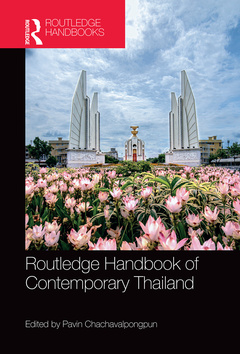Routledge Handbook of Contemporary Thailand
Coordonnateur : Chachavalpongpun Pavin

The Routledge Handbook of Contemporary Thailand is a timely survey and assessment of the state of contemporary Thailand. While Thailand has changed much in the past decades, this handbook proposes that many of its problems have remained intact or even persistent, particularly problems related to domestic politics. It underlines emerging issues at this critical juncture in the kingdom and focuses on the history, politics, economy, society, culture, religion and international relations of the country.
A multidisciplinary approach, with chapters written by experts on Thailand, this handbook is divided into the following sections.
- History
- Political and economic landscape
- Social development
- International relations
Designed for academics, students, libraries, policymakers and general readers in the field of Asian studies, political science, economics and sociology, this invaluable reference work provides an up-to-date account of Thailand and initiates new discussion for future research activities.
PART ONE: THE HISTORY; 1 Introduction: A Timeless Thailand; 2 Thailand in the Longue Durée; 3 Thai Historiography; 4 Economic Development of Post-war Thailand; PART TWO: THE POLITICAL AND ECONOMIC LANDSCAPE; 5 The Two Faces of Democracy; 6 The Logic of Thailand’s Royalist Coups d’État; 7 The Development of the Hybrid Regime: The Military and Authoritarian Persistence in Thai Politics; 8 Securing an Alternative Army: The Evolution of the Royal Thai Police; 9 The Monarchy and Succession; 10 Lèse-majesté within Thailand’s Regime of Intimidation; 11 From the Yellow Shirts to the Whistle Rebels: Comparative Analysis of the People’s Alliance for Democracy (PAD) and the People’s Democratic Reform Committee (PDRC); 12 Mass Politics and the Red Shirts; 13 Judiciary and Judicialisation in Thailand; 14 Local Government and Intergovernmental Relations in Thailand; 15 Thai State Formation and the Political Economy of the Middle Income Trap; 16 Thailand’s Corporate Sector and International Trade; 17 Industrialisation, Technological Upgrading, and Innovation; 18 Transport and the Thai State; PART THREE: THE SOCIAL DEVELOPMENT; 19 Thai Identity and Nationalism; 20 Money and Politics in Buddhist Sangha in Modern Thailand; 21 Buddhism and Power; 22 Secularisation, Secularism, and the Thai state; 23 The Southern Conflict; 24 Class, Race, and Uneven Development in Thailand; 25 The Politics, Economics and Cultural Borrowing of Thai Higher Education Reforms; 26 The State of Human Rights in the Aftermath of the 2014 Coup d’État; 27 Sex and Gender Diversity, Douglas Sanders; 28 The Social Media; 29 NGOs and Civil Society in Thailand; 30 Environmental Politics in Thailand: Pasts, Presents, and Futures; PART FOUR: THE INTERNATIONAL RELATIONS; 31 Thailand’s Foreign Policy; 32 Beyond Bamboo Diplomacy: The Factor of Status Anxiety and Thai Foreign Policy Behaviours; 33 Thailand and the Great Powers; 34 Thailand’s Foreign Policy Towards Neighbouring Countries and ASEAN
Pavin Chachavalpongpun is Associate Professor at the Center for Southeast Asian Studies, Kyoto University, Japan. He is the chief editor of the online journal Kyoto Review of Southeast Asia.
Date de parution : 08-2022
17.4x24.6 cm
Date de parution : 11-2019
17.4x24.6 cm
Thèmes de Routledge Handbook of Contemporary Thailand :
Mots-clés :
Santi Asoke; Military Junta; international relations; Junta; society; Royalist Nationalism; religion; Royal Thai Police; politics; General Prayuth Chan Ocha; kingdom; Public Administration; history; Red Shirt Protesters; handbook; Thai Style Democracy; economy; Field Marshal Sarit Thanarat; culture; King Bhumibol; Southeast Asia; Thai Foreign Policy; Thailand; Thai Politics; domestic politics; Middle Income Trap; Thailand's foreign policy; Thai State; economic landscape; Pheu Thai; royal hegemony; Thai Buddhism; Thailand's political turmoil; Red Shirts; Thai Elites; Thaksin Government; PDRC; Thailand’s Foreign Policy; Network Monarchy; Yellow Shirts; Thai Higher Education



